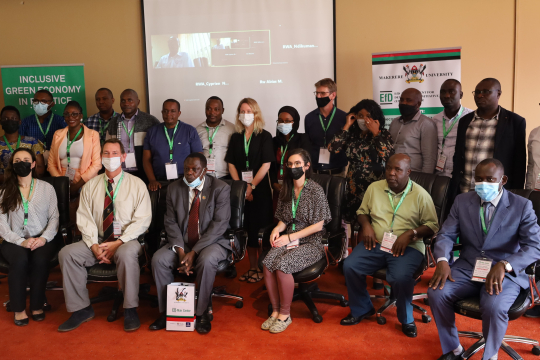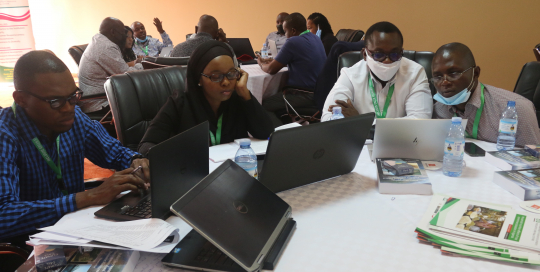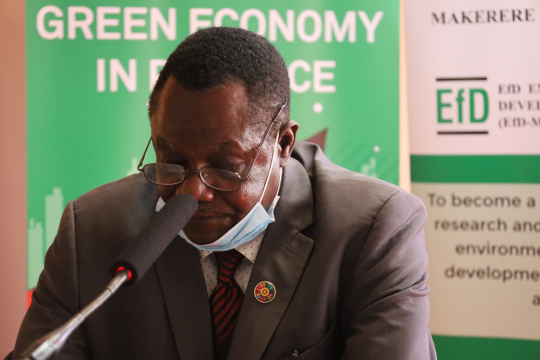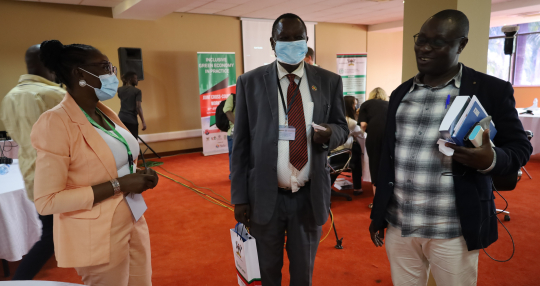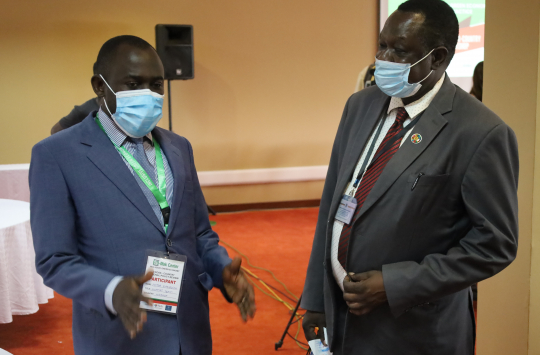The Government of Uganda will include the Inclusive Green Growth (IGE) vision in the national development plan, policies, and legal framework. This promise was given by the Director of the Directorate of Environment and Natural Resources, Collins Oloya who represented the Minister of Water and Environment, while closing the three-day joint cross-national workshop for IGE fellows in Uganda on 25th November 2021.
Over forty researchers and policymakers from Sweden, Uganda, Kenya, Rwanda, Tanzania, and Ethiopia converged at the Speke Resort Hotel Munyonyo to analyze and discuss the current use of policy instruments and gaps for a transition to a greener and more inclusive economy.
The Director said that the National Policy Reviews discussed at this meeting contribute to the attainment of the Sustainable Development Agenda as well as Uganda’s development objectives as outlined in vision 2040, the National Green Growth Strategy, the National Determined Contribution, the National Development Plan III and the Program Action Implementation Plan of the Ministry of Water and Environment and line ministries.
Suffers from degradation
He noted that although Uganda has great water resources, forests and wetlands, biodiversity, minerals, fisheries, and oil and gas resources, the care of these natural resources has suffered from the development resulting in rapid deterioration of the quantity and quality, degradation of habitats and loss of biodiversity and the associated ecosystem services.#
“In the vision 2040 the government of Uganda aspires to attain a green and clean environment with no water and air pollution, restoration of degraded areas, and conservation of the flora and fauna,” Collins Oloya said on behalf of the minister.
The legal framework is being revised
“To achieve this vision, Uganda is committed to implementing the National Development Plans. So far, three NDPs have been implemented and the country has registered an annual average growth rate of about 6.5 % over the decade preceding 2016.”
Currently, the country is implementing the NDP III (2021-2026) which is aimed at sustainable industrialization for inclusive growth, employment, and sustainable wealth creation.
“The legal framework is being revised to cater for inclusive green growth, most notably the National Environment Act 2019, the Climate Change Act 2021, the National Forestry and the Tree Planting Act, and the draft National Wetland Bill. Also, several strategic documents have been developed with a focus on inclusive green growth. The updated Nationally Determined Contribution (NDC) has been submitted to the UNFCCC. A Long-Term Emissions Development Strategy (LTEDS) is in the final stages of being developed to ensure that Uganda meets its commitments towards reduction of emissions,” the minister stated.
Under the NDPII, the Government of Uganda is now committed to budgeting and planning with a total of 17 programs that are implemented following the principles of the IGE. The different sectors have also developed sectoral strategies in line with the IGE vision.
Hindrances to implement IGE
Collins Oloya said that the implementation of reforms to streamline IGE in the national agenda, policies and legal framework has not been without challenges.
“The key hindrances to IGE not only Uganda but across the region include the issue of poverty, high population growth rates, lack of data, inadequate capacity and funding for IGE among others.
This training comes at a very opportune moment and has provided greater understanding, knowledge, and ability to critically review and analyze current economic policies and their emphasis. The training also provided more practical solutions which IGE fellows will use to address these challenges in their respective countries”, Oloya said.
Will affect the decision-making
The Director congratulated the IGE fellows upon being selected to join this program and on the completion of the online training workshops.
He is optimistic that the fellows have benefited a lot from this training and are ready to replicate these at the workplaces and later change the decision-making direction in their countries and Africa at large.
On behalf of the Ministry and Government of Uganda, Oloya expressed gratitude to the Swedish International Development Agency (Sida) for the financial support for the IGE program, and EfD at the University of Gothenburg, Uganda, Kenya, Ethiopia, Tanzania, and Rwanda for the technical support.
Compiled by;
Jane Anyango
Communication Officer, EfD-Mak Centre
